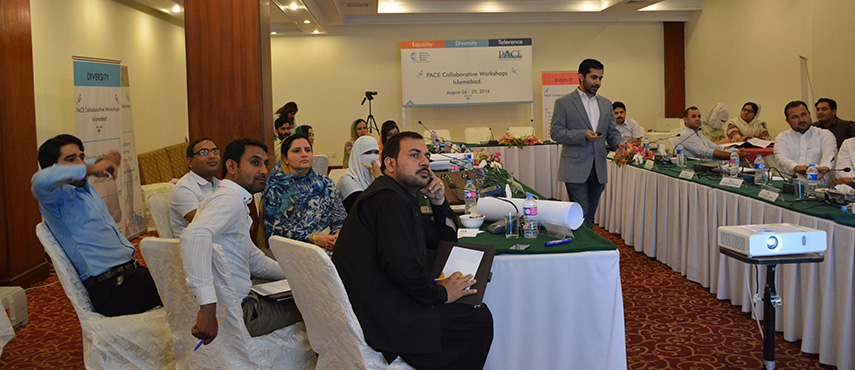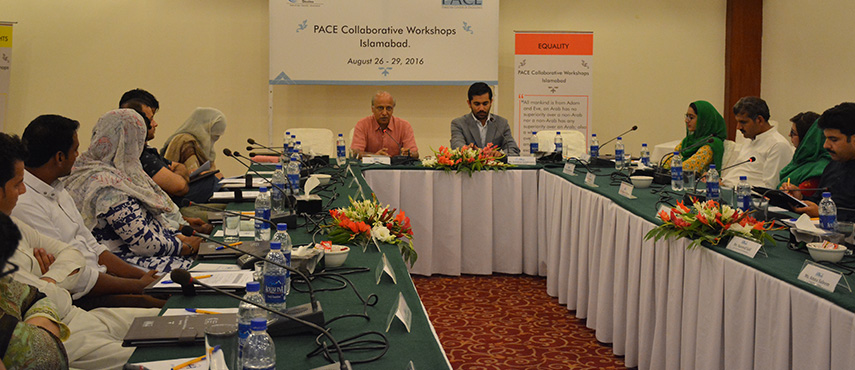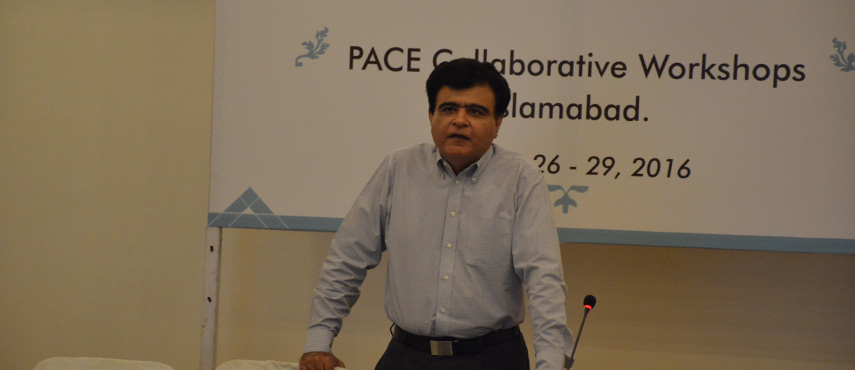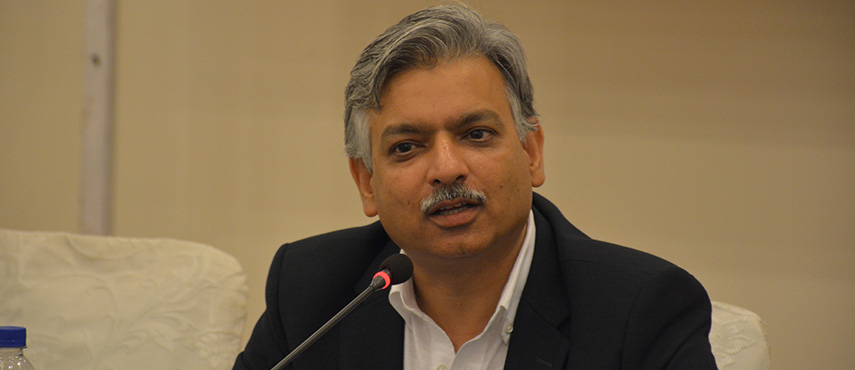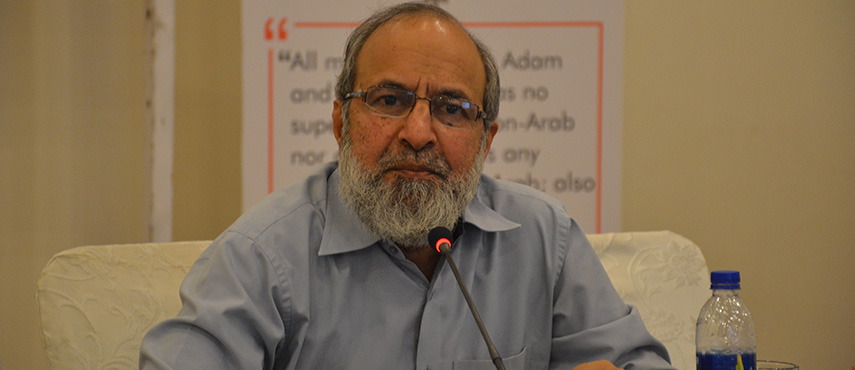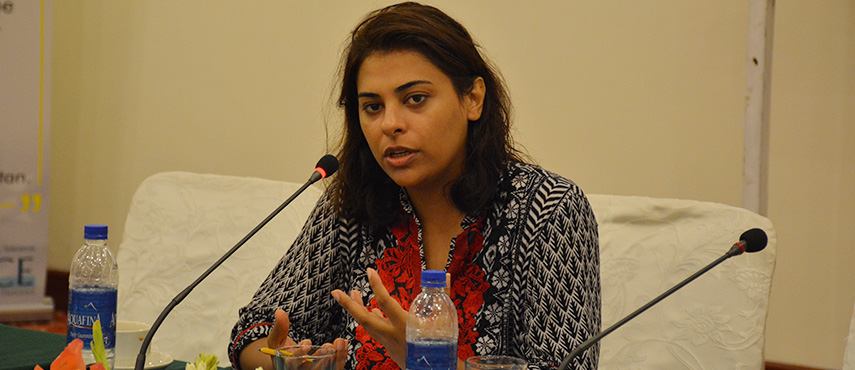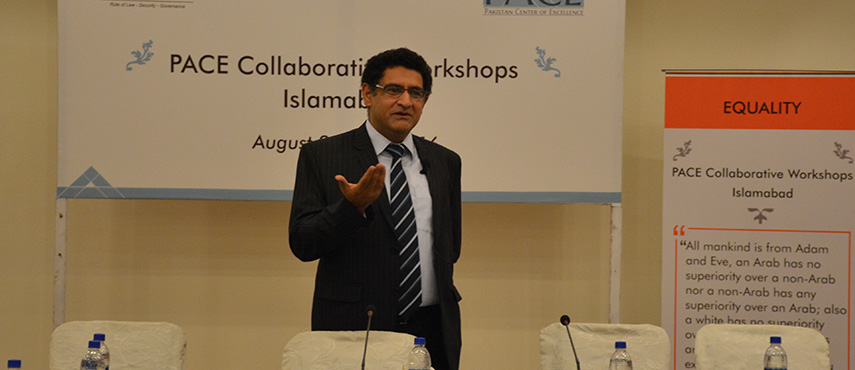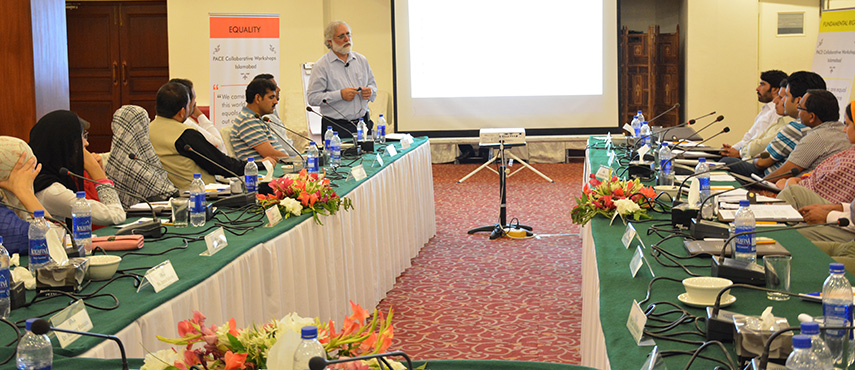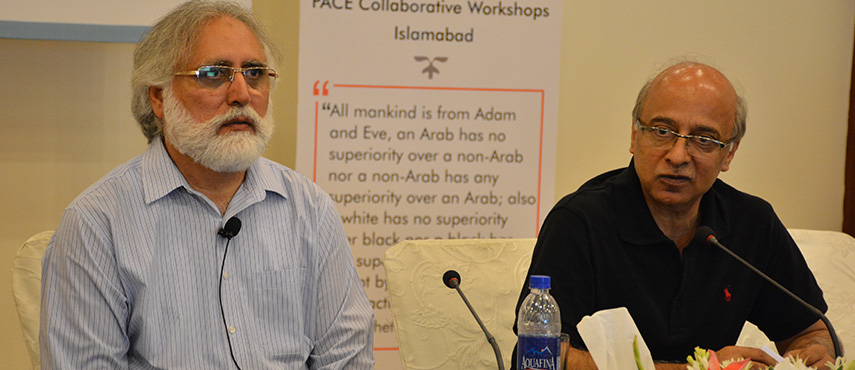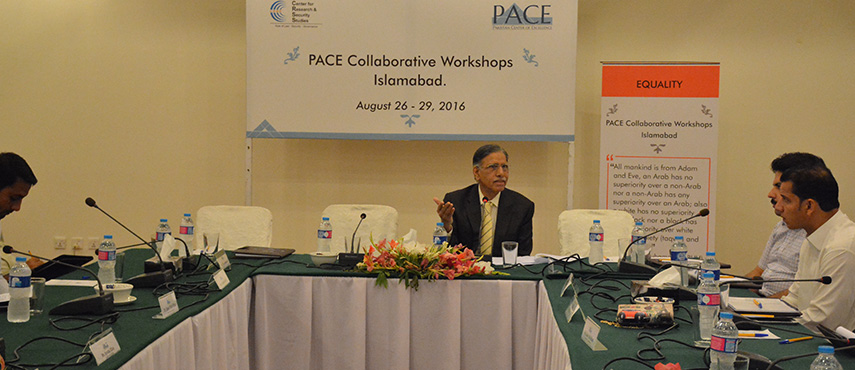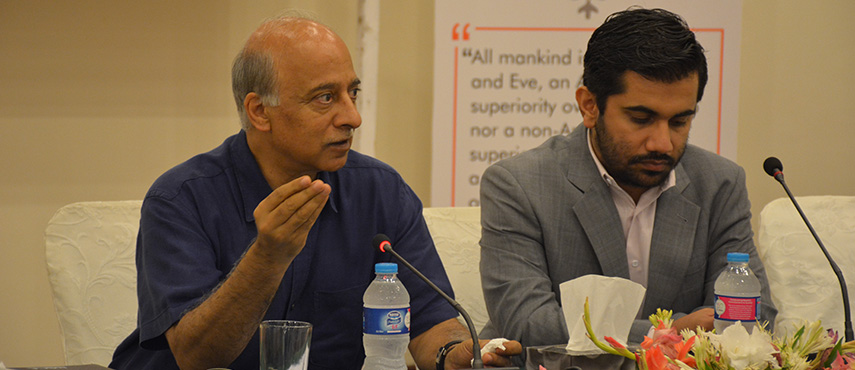The Center for Research and Security Studies (CRSS) conducted the seventh four-day collaborative workshop for young university lecturers and professors between August 26th-29th, 2016 at Hill View Hotel, Islamabad. The workshop was conducted under the umbrella of the Pakistan Center of Excellence (PACE), a counter-radicalization, pluralistic values focused project, in collaboration with the Dutch Government. Participants included young university lecturers and professors from Quaid-e-Azam University (QAU), Lasbela University, Uthal Balochistan, University of Malakand, Kohat University of Science & Technology, Sarhad University of Science and Information Technology, Peshawar, Women University, Multan, and University of Science & Technology, Bannu.
Opening Ceremony
Mr. Zeeshan Salahuddin, Project Manager, welcomed participants to the workshop, saying that PACE is put together by CRSS to counter radicalization, inculcate critical thinking, question preconceived notions and narratives, and embed the national discourse in constitutionalism and the rule of law. He said that PACE is grounded in the universal values of tolerance and acceptance; tolerance is one virtue that leads to range of other factors such as perseverance, coexistence and the idea of peace building. He elaborated that adherence to rule of law, respect for diversity, opinions and rights, and ideas of perseverance, coexistence, peace building and tolerance can be inculcated in the minds of the youth only by the teachers; the gate keepers of the future.
Mr. Imtiaz Gul, Executive Director, CRSS elaborated on the objectives of the training saying equal citizenry is a concept which is guaranteed in all the constitutions of the developed countries, including Pakistan. The workshop is designed to ponder on the issues we face in daily life but not on the basis of religion, we have to deal with the twenty basic rights entitled to the citizens of Pakistan in the constitution. Adherence to the constitution ensures social cohesion. We need to consciously treat all Pakistanis as equal citizens and should respect their rights. He said that the primary objective of the workshop was to trigger critical thinking through a discourse anchored in fundamental global values such as socio-political diversity, acceptance of diversity, rule of law and equal citizenry. The idea is to create a critical mass of young leaders equipped with the skills to critically analyze issues, look at each other as equal citizens, and correct misconceptions about marginalized communities.
Workshop Core Areas
The young professionals were trained in the following areas:
- Leadership and motivation
- Equal citizenry and respect for rule of law
- Fundamentals of democracy, governance and accountability
- Respect for diversity, opinions and rights
- Rights of minorities and other marginalized groups
- Constitutionalism, and adherence to Pakistan’s Constitution, particularly articles 8-28
- The importance of asking critical questions in the pursuit of knowledge
Workshop Modules
The cadre of young lecturers was trained by the experts in the above mentioned fields including: Dr. Niaz Murtaza, Mr. KHurshid Nadeem, Ms. Sara Farid, Dr. Khalid Zaheer, Mr. Zubair Ghauri, Mr. Toaha Qureshi and Prof. Dr. Justice (Retd.) Khalid Ali.
Mr. Niaz Murtaza shared his views on the concept of democracy and good governance. He said a state has to go through a number of stages to reach good governance. No institution is stable at its initial stage, and same is the case with democracy. Democracy only delivers when it is mature and stable.
When we look back at the history of Pakistani politics, Pakistan has never been stable, he added. It could never see the fruits of stable and mature democracy. He stimulated the discussion saying that in egalitarian societies stable institutions and leadership emerge. Egalitarian societies are the ones where people have equal access to education, capital, opportunities and freedoms. In such societies, strong institutions, able leadership and good governance emerge and development takes place.
He concluded the session saying that poor democracy is always better than the best dictatorship/authoritarianism.
Mr. Khurshid Nadeem initiated his session on multiculturalism and pluralism with reference to Islam. We use different terms in our daily lives and sometimes these terms lead to miscommunication. Secularism is also a term and it has always been under debate in our society. We actually need to know from where this term originate from and how can we apply it in our daily lives. In Europe, secularism wants to free society from religion. In USA, it wants to ensure religious freedom of the people without interference of the state.
There is another concept known as Islamic secularism, there are few states such as Indonesia which have diverse groups of people with different religions. In these states, you can live with religious freedom and also respect the religious freedom of others. But when we talk about Islamic secularism is Pakistan, it is always criticized.
To appreciate and respect the differences within a society is called multiculturalism or pluralism. If anyone tries to diminish the diversity from society, it is always against the law of nature. One can see diversity in nature and if it was not there, we would not be able to imagine life in the universe. Same is the case with society, multiculturalism beautifies it. Islam appreciates diversity in every aspect of life: religious, political and social. Islam never restricts people from practicing their own beliefs.
Dr. Khalid Zaheer kicked off the last day of the workshop and spoke on the topic of religious intolerance. He shared that religious tolerance is a right one should give to others to believe in and practice faith of their own choice. We do not have the right to impose our beliefs on others. Our attitude toward other’s beliefs should be genuine and positive. People usually believe in and practice ideas and beliefs about what they have learnt from their elders or what they have been convinced by.
We should not be abusive and violent towards the people who are not of the same belief as us. Everyone has the right to do whatever they want and believe. Being humans, we expect others to tolerate us; same is what they expect from us.
Ms. Sara Farid stated that the media should consider norms and values of a society, selection of words and body language should match the cultural values. Sensationalism should be avoided and self-censorship should be considered. Biased and abusive attitudes should not be accepted. She stressed on the importance of being neutral and presenting authentic news. She also elaborated on the future of electronic broadcast media in Pakistan.
She stressed on the importance of being neutral and presenting authentic news. She said that words are misinterpreted very often when it comes to sensitive issues; therefore, extreme care should be taken while debating on such issues.
Dr. Zubair Ghauri expanded his views on respect for diversity, opinions and rights. He said that as citizens of Islamic Republic of Pakistan, whenever we talk about humanity and humanitarian affairs, we are closely linked with the Islamic concept of human rights and equality. The constitution of Pakistan guarantees equal rights to all the citizens but the preamble restricts equal citizenry by defining the concept of divine sovereignty. But there are few minority groups who don’t believe in divine sovereignty and on the basis of their beliefs we deprive them off the concept of equal citizenry.
Dr. Toaha Qureshi kicked off his session on challenges of being a Muslim in a liberal western society in the current situation with a European perspective. He said that we are working for creating greater understanding, bringing the communities together, talking about the human rights and supporting the minorities in western societies. We started demanding to include Muslims in decision making as there was a sense of deprivation and exclusion since 9/11 happened.
Being a Muslim doesn’t stop anyone from being a good human being and be the part of mainstream society and help the communities to come together. But at the same time being a Muslim in western societies is very difficult since Islam has been portrayed as a terrorist’s religion. Minorities do have problems in every society, but we need to fill in the gulf between Muslims and the West. If we are expecting someone to respect our religion, we are equally responsible to respect their religion and way of living. We are no one to interfere in their personal matters and religious beliefs. There are problems in the western world also but they are more tolerant than us.
Prof. Dr. Justice (Retd.) Khalid Ali spoke on the topic of rule of law. Laws in Pakistan have always faced confusion and inconsistencies. It had its laws founded in British colonial period. Pakistan Penal Code and CRPC is also a product of British Colonial Era. Since the formation of Pakistan, we have seen twenty-eight years of democracy and military rule was witnessed during the rest of time. Military had their own laws by martial law orders.
There is also a law known as the Sharia law, there is a big contradiction between British law and the Sharia Law, which creates confusion among the masses. According to Article 2 of the Constitution of 1973, all the citizens are equal. But during the regime of Zia ul Haq, Article 2(A) was included in which Objective Resolution was made a substantive part of the Constitution. Hudood Ordinance was also enforced during this regime to curb adultery, theft and the use of wine, which was seen as a abolition of fundamental human rights.
Military courts have also been established in Pakistan in different times during the course of history; most recent was right after the APS attack to curb terrorism with the validation of the Parliament for two years. If Supreme Court of Pakistan makes a law, all the lower courts are bound to follow it.
In short, since the 1947 Pakistan had to face inconsistencies and delays in law making process. Laws are made to be implemented and followed; only in this case we can become a developed nation which can compete with other nations of the world.
Mr. Imtiaz Gul, Executive Director, CRSS in his closing remarks encapsulated some of the ideals that prompted the creation of PACE. He said that these ideals also resonated with the core values that are acknowledged, practiced and respected as fundamental to social harmony, political peace and national cohesion. He further said that it is important to keep politics and religion separate. The mark of a tolerant society is to seek knowledge, and engage in constructive, positive dialogue.

